Airline summit gives inside look into the future of aviation
Plane Talk: There was a special place in Brussels reserved for the time, energy and money squandered in preparation for Brexit

Your support helps us to tell the story
From reproductive rights to climate change to Big Tech, The Independent is on the ground when the story is developing. Whether it's investigating the financials of Elon Musk's pro-Trump PAC or producing our latest documentary, 'The A Word', which shines a light on the American women fighting for reproductive rights, we know how important it is to parse out the facts from the messaging.
At such a critical moment in US history, we need reporters on the ground. Your donation allows us to keep sending journalists to speak to both sides of the story.
The Independent is trusted by Americans across the entire political spectrum. And unlike many other quality news outlets, we choose not to lock Americans out of our reporting and analysis with paywalls. We believe quality journalism should be available to everyone, paid for by those who can afford it.
Your support makes all the difference.For most of their working lives, the bosses of Europe’s biggest airlines devote themselves to the cut-throat rivalry that prevails in the most competitive aviation market in the world. Yet for one day a year, they gather together in Brussels to complain. Not to each other, but to governments and European regulators about issues that annoy them all.
The forum is the summit of their trade body, Airlines 4 Europe, organised in association with FlightGlobal. Year in, year out, the reproachful refrain remains the same: air-traffic control shortcomings, iniquitous passengers’ rights rules and aviation taxes – particularly the UK’s Air Passenger Duty.
In 2019, there was a special place in Brussels reserved for the time, energy and money that airlines have been forced to squander in preparation for Brexit.
Having a common enemy or two helps to make the chief executives uncommonly congenial to each other. And during the course of the day they reveal, inadvertently or deliberately, signals about how they see the future for airline passengers.
Here’s Willie Walsh, chief executive of IAG – parent company of British Airways, Iberia, Aer Lingus and Vueling. Does the expected announcement of JetBlue on two key markets, Boston and New York to London, present a threat to his firm?
“They’ve said for at least the last three years that they’re going to announce flights,” he told me. “It’s not going to change the landscape.”
Robin Hayes, former BA executive who is now boss of the New York-based airline, has a different view; before the event he told me: “JetBlue flying to Europe would have a very important and profound effect in lowering fares.”
The dynamic between Willie Walsh and his Ryanair counterpart, Michael O’Leary, is always fascinating. The two Irishmen have been sparring for decades. But now the budget airline boss is pursuing the business model established by his arch-rival – an airline group that competes internally for investment: who gets the next batch of shiny new planes, for example?
Mr O’Leary is giving up the role at the head of Europe’s biggest budget airline to become the chief executive of the Ryanair group, which also includes Laudamotion of Vienna and Polish operation Ryanair Sun. The group is poised to expand opportunistically.
Mr Walsh, meanwhile, spied an opportunity during a debate involving KLM boss Pieter Elbers. He teased the Dutchman by asking: “When are you going to join Oneworld?” Mr Walsh knows that, culturally and commercially, KLM would be a far better fit for the alliance that includes British Airways rather than the SkyTeam alliance that includes Air France, where the Dutch carrier is the more-profitable-but-less-senior partner.
With the Netherlands government increasingly concerned about protecting its vital aviation market, do not rule out a sudden shift in loyalty – which would transform the airline landscape in Europe.
Carsten Spohr of Lufthansa revealed: “My biggest competitor is Air France/KLM. My second biggest is Turkish.” And he barely regarded Ryanair as a competitor, saying: “The overlap between Ryanair and Lufthansa is only 1 per cent.”
He did though, deplore the Irish airline’s €9 fares. “I don’t think we need €9 fares,” said the Lufthansa CEO. “I don’t think there are €9 tickets in the US or on domestic routes in China.”
But Mr O’Leary hit back, saying: “Should everyone be flying around Europe for €9? Probably not. But if that’s what it takes to get people to fly to Frankfurt on a Tuesday in November, we’ll take it.
“Are we as the five biggest airlines in Europe making more money than ever? Yes.”
So the bargains will persist as Ryanair’s mantra of “yield passive, load factor active” continues: the Irish airline will cut fares to whatever levels are necessary to fill its planes. Good luck to everyone else.
The day ended with some amicable arm-wrestling on the subject of “my airline is older than yours”.
Britsh Airways is making a big thing of its 100-year heritage. But Pieter Elbers pointed out that the 1919 date BA has carbon-dated relates to Aircraft Transport and Travel Ltd; British Airways came far later. KLM, in contrast, has been flying for 100 years under the same name.
And Mr Spohr of Lufthansa chimed in to point out that the German airline had suffered a mid-century interruption: “We were grounded from 1945 to 1955.” he lamented. “But it was our fault.”
Civil aviation brings the world together. But after this very civil event, it was remarkable how many participants went home by train.
Join our commenting forum
Join thought-provoking conversations, follow other Independent readers and see their replies
Comments